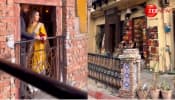New Delhi: The Supreme Court Monday permitted devotees to access the sanctum sanctorum of Kolkata`s Kalighat temple to pay obeisance to the deity.
An apex court bench of Justice Deepak Verma and Justice S.J. Mukhopadhaya cleared the decks for the entry of devotees into the sanctum sanctorum after it stayed the April 20, 2012 order of the Calcutta High Court that had banned the entry of the devotees, including VVIPs, to the `Garba girha` (sanctum sanctorum).
The court, however, said that the Kalighat temple committee would follow a high court direction on the cleanliness of the temple.
While staying the high court order, the Supreme Court observed that in south India, devotees are not permitted in the sanctum sanctorum, as they have a concept of `darshan`, whereas in north and east India, there is a concept of `puja` and touching the feet of the deity.
The Supreme Court had Tuesday had issued notice to the central and West Bengal governments on a petition that devotees be permitted to enter the sanctum sanctorum of the Kalighat temple.
Justice Deepak Verma and Justice S.J. Mukhopadhyay had issued the notice after it was told that devotees were not allowed to enter the temple`s sanctum sanctorum following a Calcutta High Court order.
The petition was moved by the Kalighat Temple Committee, which had challenged the high court order banning the entry of devotees into the sanctum sanctorum and allowing only two "pujaris (priests)" at a time.
The high court had directed that the temple committee would put, on the notice board, the names of the pujaris and their duty hours according to their duty roster.
Counsel for the Kalighat Temple Committee Rana Mukherjee had told the court that the ban on the entry of devotees was posing a law and order problem.
The petition had said that the committee has a strong prima facie case and would suffer an irreparable loss if the interim order of the high court was not stayed.
The high court had passed its order after hearing a public suit seeking directions to the temple committee to ensure that the temple in general and the sanctum sanctorum in particular is kept in a clean state.
The suit also sought direction that the devotees should not be allowed to throw flowers at the idol and the sanctum sanctorum should not be littered with any kind of material, including flowers.
The high court directed the temple committee to make necessary arrangements so that all the offerings made by the devotees were credited in the account of the temple and not appropriated by the pujaris.
The high court was told that devotees and visitors were often cheated by people posing as pujaris and pandas who were indulging in extortion and there were lots of incidents of thefts.
Assailing the order restricting the devotees from entering the sanctum sanctorum, the petition said that the interim order did not take into account the "religious sentiments and emotions of the public at large" as the Kalighat temple houses the "sacred deity of the Sree Kalimata Thakurani", which is an important place of pilgrimage for Hindus from all over the country.
The petition by the Kalighat Temple Committee contended that such a restriction violated the fundamental rights of the devotees.
The petition contended that the high court could not have passed any order beyond the prayer seeking direction for the cleanliness of the sanctum sanctorum and for security arrangements in the premises.
IANS















